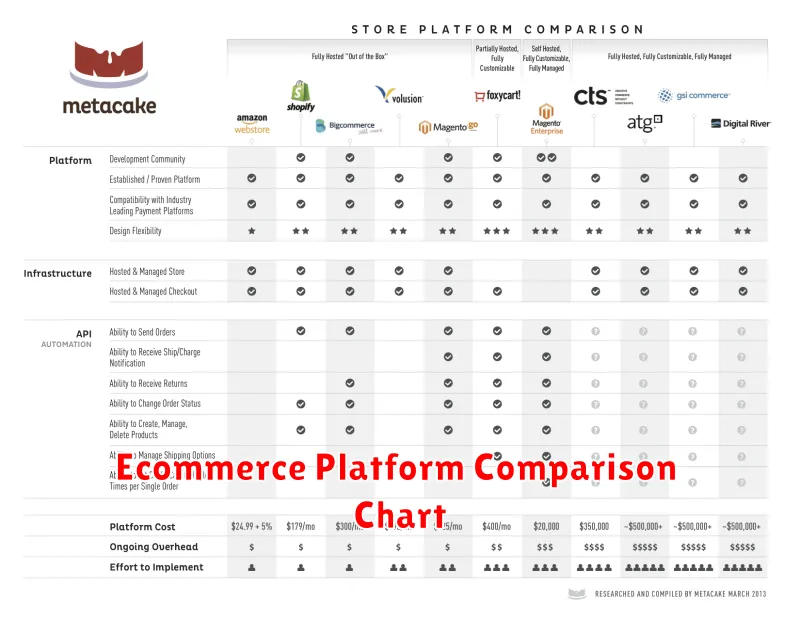Choosing the right ecommerce platform is crucial for the success of any online business. With so many options available, it can be overwhelming to navigate the crowded marketplace and find the perfect fit for your unique needs. This article will delve into a comprehensive ecommerce platform showdown, comparing the top contenders based on key features, pricing, scalability, and ease of use. We’ll equip you with the knowledge to make an informed decision, helping you launch and grow your online store with confidence.
Whether you’re a seasoned entrepreneur launching your next big venture or a first-time business owner taking your first steps into the world of online retail, finding the right ecommerce platform is essential. This guide will explore the leading platforms, highlighting their strengths and weaknesses, so you can choose the one that aligns perfectly with your business goals, budget, and long-term vision.
The Importance of Selecting the Right Ecommerce Platform
In the dynamic world of e-commerce, selecting the right platform is paramount to your success. It’s not just about aesthetics; it’s about creating a robust and scalable foundation for your online business. The platform you choose dictates everything from the user experience and product catalog management to marketing capabilities and payment processing. A poorly chosen platform can lead to a frustrating customer journey, limited growth potential, and ultimately, lost revenue.
Therefore, it’s crucial to invest time and effort in thoroughly researching and evaluating different options. Consider factors like your business needs, budget, and long-term growth aspirations. A platform that perfectly aligns with your vision will empower you to:
- Build a user-friendly and engaging storefront: A platform should offer intuitive navigation, responsive design, and customization options to create a unique brand identity that resonates with your target audience.
- Manage products efficiently: Look for features like inventory management, order fulfillment, and product variations that streamline your operations and prevent errors.
- Drive sales and customer engagement: A powerful platform will offer marketing tools such as email marketing integration, social media integration, and loyalty programs to help you acquire and retain customers.
- Ensure secure and reliable transactions: Secure payment gateways, fraud protection, and robust data security measures are essential for building trust and confidence with your customers.
- Scale with your business: As your business grows, your platform should be able to handle increased traffic, orders, and data volume without compromising performance.
Ultimately, the right e-commerce platform is an investment that pays dividends in the long run. By making a strategic choice, you’ll position your business for success in the competitive online landscape.
Key Factors to Consider When Comparing Ecommerce Platforms
Choosing the right ecommerce platform is crucial for your business’s success. With so many options available, the decision can feel overwhelming. To streamline the process, consider these key factors:
1. Features and Functionality: Determine what features are essential for your business. Consider aspects like product catalog management, order fulfillment, payment processing, inventory tracking, shipping and delivery, marketing tools, customer service, and reporting. Some platforms are better suited for specific industries or business models. For example, if you’re selling digital products, you might need a platform that supports file delivery.
2. Scalability: Choose a platform that can grow with your business. Consider how much traffic your website can handle, how many products you plan to sell, and how your business might evolve in the future. Look for platforms that offer flexible plans and can accommodate increasing demand.
3. Pricing and Costs: Ecommerce platforms come with different pricing models. Consider the monthly subscription fees, transaction fees, and other costs associated with the platform. Factor in the cost of themes, plugins, and other add-ons that may be necessary to build the website you want.
4. Ease of Use and Design Flexibility: The platform should be easy to use and navigate, both for you and your customers. Look for platforms with intuitive interfaces and customization options. Ideally, you should be able to create a website that reflects your brand and appeals to your target audience.
5. Security and Reliability: Ecommerce platforms must be secure to protect your business and your customers’ data. Choose a platform with a proven track record of security, uptime, and reliability.
6. Integration Options: Consider your existing tools and systems. Choose a platform that can integrate seamlessly with your email marketing software, CRM, accounting software, or other essential business applications.
7. Customer Support and Resources: Look for a platform with responsive customer support and comprehensive documentation. You’ll need help setting up your store, troubleshooting issues, and staying up-to-date with the latest platform updates.
By carefully evaluating these key factors, you can narrow down your choices and find the ecommerce platform that is the perfect fit for your business.
Popular Ecommerce Platforms: An Overview
As your business ventures into the digital world of e-commerce, selecting the right platform is crucial for success. With a plethora of options available, each with unique features and capabilities, choosing the perfect fit can seem daunting. But fear not! This article will navigate you through the popular platforms, offering an overview to help you make an informed decision.
Shopify, the industry darling, reigns supreme for its user-friendliness, scalability, and extensive app ecosystem. It offers a comprehensive suite of tools for managing your store, from product listings and inventory control to marketing and customer service. WooCommerce, a powerful open-source solution, integrates seamlessly with WordPress, providing unparalleled flexibility and customization. While requiring technical expertise, WooCommerce offers a robust platform for building and managing your online store.
For established businesses with large catalogs and complex requirements, BigCommerce presents a strong alternative. Its enterprise-level features and powerful analytics tools empower businesses to manage vast product assortments and optimize performance. Magento, another open-source powerhouse, provides unparalleled customization and scalability, catering to businesses with high-volume traffic and unique needs. However, Magento requires significant technical expertise and ongoing maintenance.
Squarespace and Wix are popular choices for small businesses and individual entrepreneurs, offering user-friendly drag-and-drop interfaces and beautiful templates. These platforms prioritize aesthetics and simplicity, making it easy to create a visually stunning online store. Etsy is a niche marketplace specifically designed for handmade, vintage, and craft items, providing a dedicated community and audience for creators.
Understanding the strengths and limitations of each platform is essential for selecting the ideal solution for your business. Consider factors such as your budget, technical expertise, product volume, and desired features to make the most informed decision. The right e-commerce platform can act as a solid foundation for your online success.
Shopify: Ideal for Small to Medium-Sized Businesses
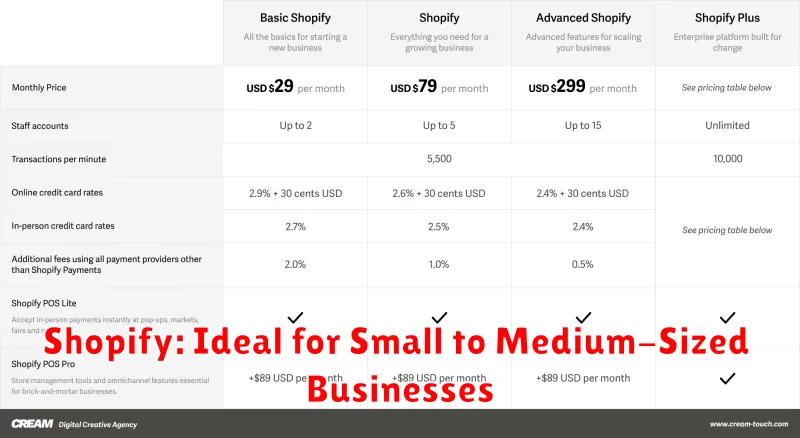
Shopify is a popular e-commerce platform that caters specifically to small and medium-sized businesses. Its ease of use, comprehensive features, and robust app ecosystem make it a strong contender for entrepreneurs looking to establish their online presence.
One of Shopify’s greatest strengths is its user-friendly interface. Even those with limited technical expertise can easily navigate the platform and set up their online store. Shopify provides a variety of templates and themes, allowing businesses to create visually appealing websites that reflect their brand identity.
Beyond its user-friendliness, Shopify offers a wide range of features designed to streamline e-commerce operations. These features include secure payment processing, inventory management, order fulfillment, and marketing tools. Shopify also integrates seamlessly with third-party applications, enabling businesses to expand their functionality and customize their stores to meet their specific needs.
Another key advantage of Shopify is its scalability. As your business grows, Shopify can adapt to accommodate your increasing needs. From handling a surge in traffic to managing a larger inventory, Shopify provides the infrastructure to support your business’s expansion.
Overall, Shopify presents an attractive option for small and medium-sized businesses seeking a comprehensive and user-friendly e-commerce platform. Its combination of ease of use, robust features, and scalability makes it a powerful tool for launching and growing an online business.
WooCommerce: A Powerful Option for WordPress Users
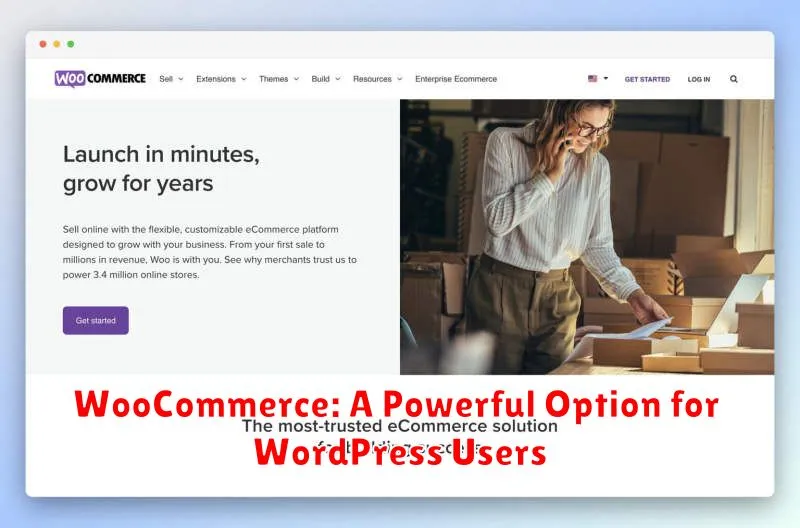
If you’re a WordPress user looking to launch an online store, WooCommerce stands out as a powerful and popular choice. As an open-source plugin, it seamlessly integrates with your existing WordPress website, giving you complete control over your store’s design and functionality.
One of the key advantages of WooCommerce is its flexibility. Its open-source nature allows for extensive customization. Whether you need to adjust the checkout process, add unique product features, or integrate with specific payment gateways, WooCommerce offers a vast ecosystem of extensions and themes to suit your needs.
Another significant factor is its cost-effectiveness. WooCommerce is free to use, making it an attractive option for businesses on a budget. While you may need to invest in premium themes, extensions, or hosting, the initial cost is considerably lower compared to other e-commerce platforms.
Furthermore, WooCommerce enjoys a strong community and robust support. With a large user base, you can easily find answers to your questions, access tutorials, and leverage the collective wisdom of the WooCommerce community.
However, it’s worth noting that WooCommerce may require a higher level of technical expertise compared to some other platforms. You’ll need to manage updates, security, and other technical aspects of your store. This may not be ideal for users who prefer a more hands-off approach.
In conclusion, WooCommerce is an excellent option for WordPress users seeking a powerful, customizable, and cost-effective e-commerce solution. However, be prepared to invest time and effort to manage its technical aspects.
Magento: Scalable Solution for Enterprise-Level Ecommerce
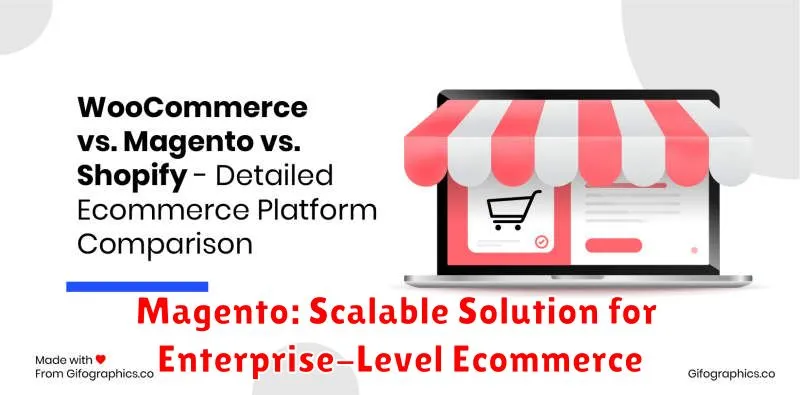
For businesses seeking an enterprise-grade ecommerce platform that can handle significant traffic and complex product catalogs, Magento stands out as a powerful and scalable solution. Magento offers a comprehensive feature set designed to support the unique needs of large organizations.
One of Magento’s greatest strengths lies in its scalability. Its architecture is designed to handle massive amounts of data and traffic, making it ideal for businesses experiencing rapid growth or selling a wide variety of products. Whether you’re dealing with thousands of SKUs, managing multiple stores, or expecting a surge in holiday orders, Magento can adapt and perform.
Another key advantage is its flexibility. Magento provides a high degree of customization, allowing businesses to tailor the platform to their specific requirements. This flexibility extends to everything from design and functionality to integrations with other business systems.
While Magento offers a robust feature set and scalability, it’s important to note that it also comes with a steeper learning curve compared to some other platforms. Its complexity may require a more technical team to manage and maintain. However, its extensive community support and a wealth of resources are available to help businesses overcome these challenges.
For businesses prioritizing scalability, customization, and a platform that can adapt to their evolving needs, Magento is a strong contender. Its comprehensive feature set and robust architecture make it a solid choice for handling the demands of enterprise-level ecommerce.
BigCommerce: Feature-Rich Platform for Growing Businesses
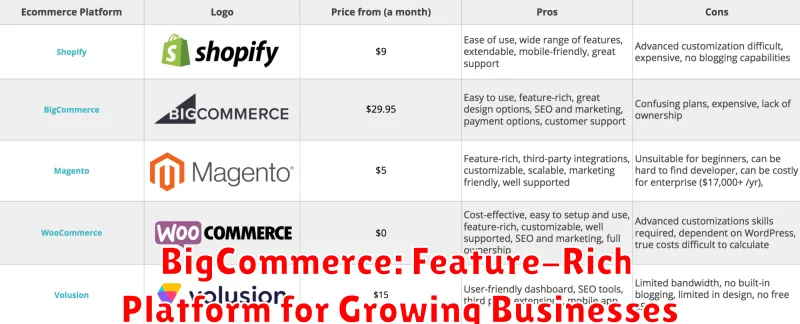
If you’re looking for a robust and feature-rich platform to power your online store, BigCommerce is a strong contender. Designed for businesses of all sizes, BigCommerce offers a comprehensive suite of tools that can help you grow your business and scale your operations.
One of the biggest advantages of BigCommerce is its scalability. With a powerful infrastructure that can handle high traffic volumes and large product catalogs, BigCommerce is well-suited for businesses that are experiencing rapid growth. You can easily add new products, expand into new markets, and handle a surge in orders without worrying about performance issues.
BigCommerce also excels in its feature set. From built-in SEO tools and marketing automation capabilities to powerful analytics and reporting, BigCommerce gives you the tools you need to drive sales, optimize your website, and understand your customers.
Here are some of the key features that make BigCommerce stand out:
- Built-in security: BigCommerce takes security seriously, offering robust security features to protect your store and customer data.
- Powerful SEO tools: BigCommerce’s built-in SEO tools can help you improve your website’s ranking in search results, driving more organic traffic to your store.
- Flexible checkout options: With multiple payment gateways, shipping options, and checkout customization tools, BigCommerce makes it easy to provide a smooth and secure checkout experience for your customers.
- Extensive app marketplace: The BigCommerce App Marketplace offers a wide range of apps that can extend the functionality of your store, from marketing and analytics to customer support and shipping.
- Excellent customer support: BigCommerce provides 24/7 support to help you with any questions or technical issues you may encounter.
Overall, BigCommerce is a great choice for businesses that are looking for a powerful, scalable, and feature-rich platform to power their online store. With its robust features, excellent support, and competitive pricing, BigCommerce is an ideal solution for businesses of all sizes.
Wix Ecommerce: User-Friendly Platform for Beginners
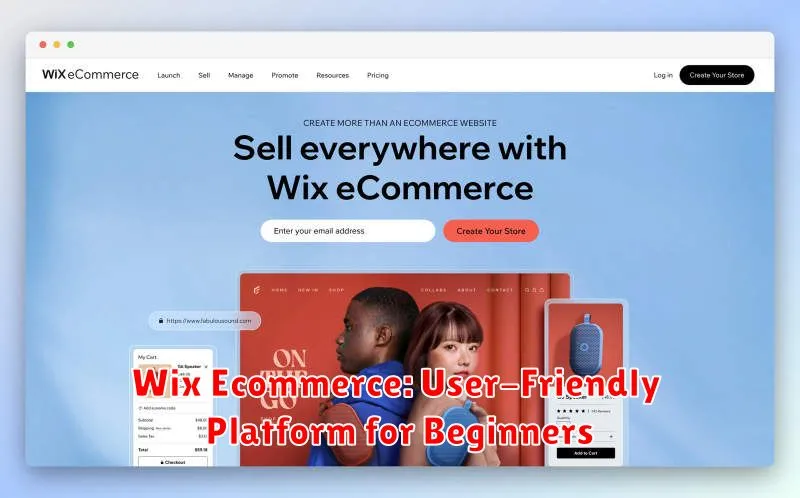
If you’re new to the world of ecommerce and looking for a user-friendly platform to build your online store, Wix Ecommerce is a great option. Wix offers a drag-and-drop website builder, making it incredibly easy to create a visually appealing and functional online store, even without prior coding experience.
One of the key strengths of Wix Ecommerce is its intuitive interface. You can easily add products, manage inventory, set prices, and customize your storefront to match your brand. Wix provides a variety of professional-looking templates, so you can create a website that looks polished and professional without needing design expertise.
Wix also offers a range of helpful features for managing your online store, including:
- Integrated payment gateways: Accept payments from major credit cards and digital wallets directly through your website.
- Abandoned cart recovery: Reconnect with customers who left items in their shopping carts and encourage them to complete their purchase.
- Marketing tools: Build email lists, create promotional campaigns, and track your marketing efforts to drive sales.
- Mobile optimization: Ensure your store looks great and functions seamlessly on all devices.
Wix offers a variety of pricing plans, so you can choose the one that best suits your needs and budget. The free plan is a great option for testing out Wix Ecommerce, but if you’re serious about selling online, you’ll want to upgrade to one of the paid plans for access to all of the platform’s features.
Pricing and Plans: Understanding the Costs Involved
Choosing the right ecommerce platform involves more than just considering features and functionality. Pricing and plans are crucial factors to evaluate. Ecommerce platforms offer a variety of pricing models, including monthly subscription fees, transaction fees, and add-on services. It’s essential to understand these costs and how they can impact your overall budget.
Subscription fees are the most common pricing model. These fees are typically charged monthly or annually and provide access to the platform’s core features. Transaction fees, on the other hand, are charged for every sale you make. These fees can vary based on the platform and payment gateway used. Some platforms offer a fixed transaction fee, while others charge a percentage of the sale. Be sure to consider the potential impact of transaction fees on your profit margins.
Add-on services, such as advanced marketing tools, customer support, or inventory management, can also add to the overall cost. These services may be available as standalone add-ons or bundled into different pricing plans. It’s crucial to assess your needs and determine which add-ons are essential for your business. Don’t get swayed by flashy features if you don’t need them, as they will just unnecessarily increase your expenses.
Take your time to carefully compare pricing plans and consider your business’s specific needs. Look beyond the initial cost and factor in the long-term expenses associated with each platform. Make sure the chosen platform offers a pricing structure that aligns with your budget and future growth goals.
Ease of Use and Customization Options
When choosing an ecommerce platform, ease of use and customization options are paramount. A platform should be intuitive and easy to navigate, even for those without technical expertise.
Look for platforms with drag-and-drop builders, pre-built templates, and extensive documentation. This empowers you to create an online store that reflects your brand and meets your specific needs.
Customization is crucial for differentiation. You should be able to tailor the platform to match your brand’s aesthetic, incorporate your logo and colors, and personalize the customer experience.
Flexibility is key. You should be able to modify the layout, add features, and integrate with third-party tools to enhance functionality.
Consider your team’s technical skills and budget when evaluating these factors. Some platforms offer more robust customization options, but may require more technical expertise or investment.
Payment Gateways and Integrations
Payment gateways are the backbone of any successful ecommerce platform, seamlessly processing transactions between your customers and your bank. When choosing an ecommerce platform, it’s crucial to evaluate its payment gateway options and integration capabilities.
Consider these key aspects:
- Supported payment methods: Ensure the platform supports the payment methods your target audience prefers, such as credit cards, debit cards, PayPal, digital wallets, and local payment options.
- Transaction fees: Compare transaction fees charged by different platforms and gateways. Look for transparent pricing models with minimal hidden costs.
- Security: Prioritize platforms that offer robust security features like encryption, fraud prevention, and PCI DSS compliance to protect customer data.
- Integration ease: The platform should allow easy integration with popular payment gateways, reducing setup time and effort.
- Customer support: Choose a platform with reliable support for troubleshooting payment issues and resolving customer inquiries.
A platform with a robust payment gateway integration will streamline transactions, enhance customer experience, and boost your business’s overall success.
Customer Support and Resources
When selecting an ecommerce platform, it’s crucial to consider the level of customer support and resources available to you. This includes factors like the platform’s response time, availability of live chat, phone support, email support, and a comprehensive knowledge base. Look for a platform that provides 24/7 support, multiple communication channels, and proactive support measures like tutorials and webinars.
Moreover, the availability of community forums, integration partners, and developer documentation is critical. A strong community allows you to connect with other users and gain valuable insights, while integrations can streamline your business processes and improve efficiency. Well-organized developer documentation empowers you to customize your platform and build unique solutions tailored to your specific needs.
Remember, reliable customer support and robust resources are essential for a smooth and successful ecommerce journey. By prioritizing these aspects, you can ensure that you have the necessary assistance and knowledge to navigate the complexities of running an online business.
Making the Decision: Which Ecommerce Platform is Right for You?
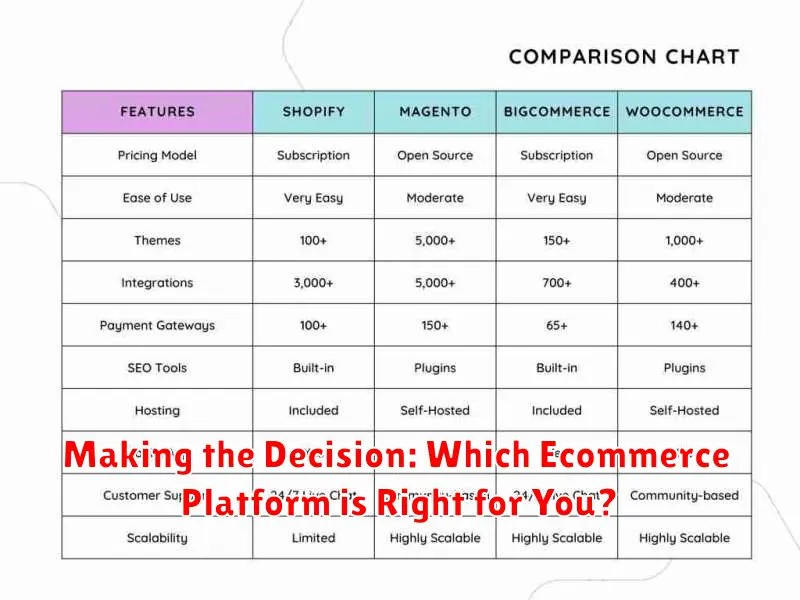
Choosing the right ecommerce platform is crucial for your business’s success. It’s the foundation upon which you build your online store, impacting everything from product display and checkout to marketing and customer service.
The decision shouldn’t be taken lightly. Numerous platforms cater to diverse needs, each with its strengths and weaknesses. To make an informed choice, consider these factors:
- Your budget: Some platforms are free, while others come with monthly fees or transaction fees.
- Your technical expertise: Some platforms are easier to use than others, so consider your team’s skill level.
- Your business goals: What features are most important to you? Do you need advanced analytics, marketing tools, or specific integrations?
- Your target audience: What are your customers’ preferences? Do they prefer a mobile-friendly experience or a more traditional desktop interface?
- Scalability: Can the platform handle your projected growth?
Once you’ve assessed these factors, you can narrow down your choices to a few platforms that align with your needs. Don’t hesitate to try out free trials or demos to get a feel for each platform before making a final decision. Remember, choosing the right platform will empower you to build a successful online store and reach your target audience effectively.
Case Studies: Businesses That Chose the Perfect Platform
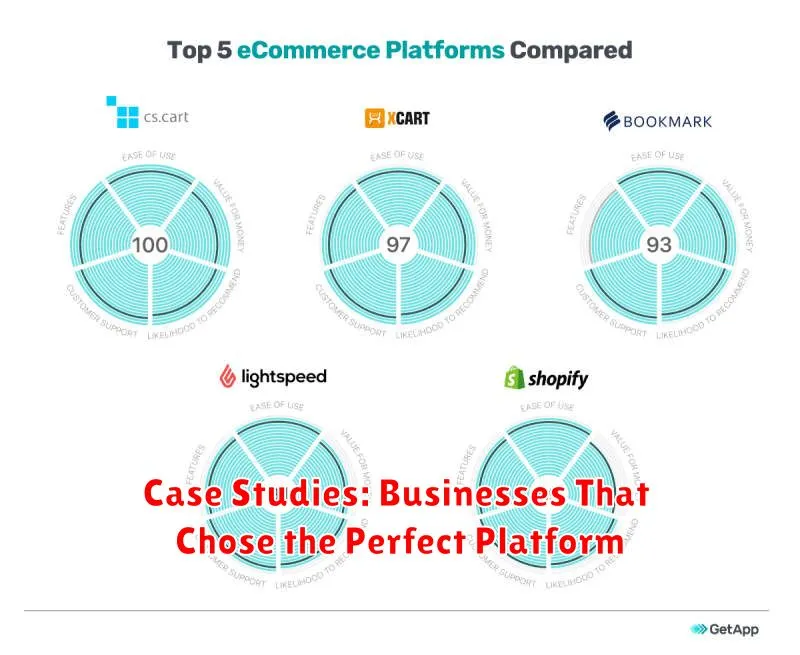
Choosing the right ecommerce platform is a critical decision for any business. It can make or break your online presence. To help you visualize how different platforms work in practice, let’s dive into some real-world examples.
Shopify has become a popular choice for businesses of all sizes, including:
- GymShark: This fitness apparel brand uses Shopify to power its global online store. Shopify’s robust features, including its integrated payment gateway, helped GymShark scale its business rapidly and reach a wide audience.
- Kylie Cosmetics: Kylie Jenner’s beauty empire relies on Shopify’s user-friendly interface and customizable templates to create a visually appealing online shopping experience.
For businesses seeking a powerful and flexible platform, Magento often stands out.
- Ford Motor Company: This automotive giant utilizes Magento’s advanced functionalities to manage its diverse product catalog and provide a personalized shopping experience for its customers.
- Warby Parker: The popular eyeglass retailer uses Magento to create a seamless online experience, integrating its website with social media platforms and other marketing channels.
If you are looking for a platform that offers cost-effectiveness and ease of use, WooCommerce might be the right fit.
- Timberland: The renowned footwear and apparel brand uses WooCommerce to power its website, leveraging its affordability and integration with WordPress.
- Etsy: The online marketplace for handmade goods, crafts, and vintage items relies on WooCommerce’s flexibility to cater to the unique needs of its sellers and buyers.
These are just a few examples of how businesses have found success with different ecommerce platforms. By carefully considering your business needs and goals, you can choose the right platform for your success.

